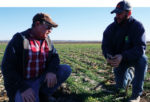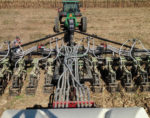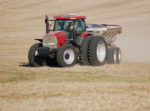Advertise Follow Us
Articles Tagged with ''potash''
Beck's Practical Farm Research (PFR) nutrient management study also reveals slight edge for spring strip-till over fall strip-till
Read More
[Podcast] Improving Your ROI with Cover Crops
In this episode of the No-Till Farmer podcast, brought to you by Yetter Mfg., we're joined by veteran no-tiller Dave Brandt of Carroll, Ohio, who shares some of his many experiences with cover crops.
Read More
Conquering Stubborn Soils and Residue with a Switch to Strip-Till
Seeding and fertilizing experimentation enables Nebraska farmers to better manage residue, convert poor fields into pivotal performers.
Read More
No-Tillers May Want to Re-Examine Soil Test ‘K’, Application Habits
Study finds little or no correlation between soil-test potassium levels and higher yields, with crop residue and deeper soil reserves providing more than enough of the nutrient.
Read More
The Secrets of No-Till Yield Champions
No-tillers David Hula and Kip Cullers say spoon-feeding crops at the right time, intensive scouting, healthy soils and even emergence have helped them raise contest-winning corn and soybean yields.
Read More
Yield Contest Winner Pushes Bushels With Focus On Fertility
Nebraska no-tiller Mike Scholting shares how zeroing in on fertilizer applications is increasing yields both on and off his contest ground.
Read More
No-Till And Strip-Till: The Best Of Both Worlds
Precision technology, cover crops and innovative equipment are helping Indiana no-tiller and strip-tiller Mike Shuter and sons get the most out of two different conservation-tillage systems.
Read More
Tips For Getting More From Your ‘P And K’
Building healthier no-till soils, frequent soil testing and other readily available products and practices can help no-tillers stretch their fertility dollars further, regardless of their application system.
Read More










